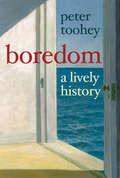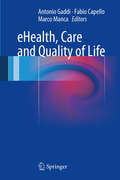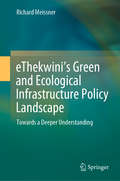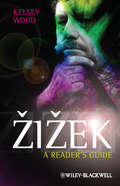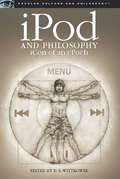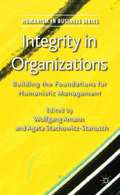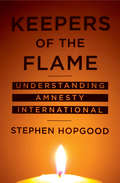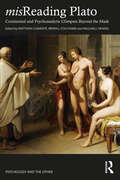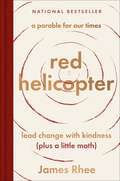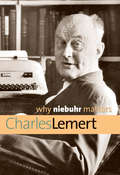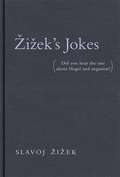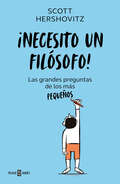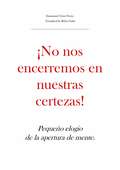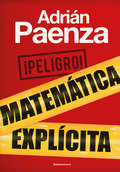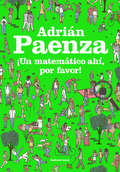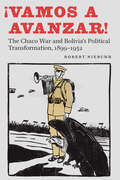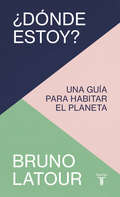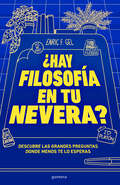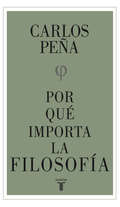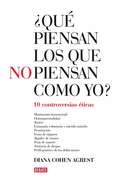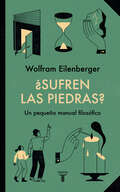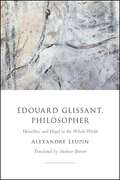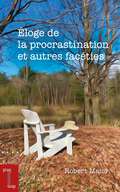- Table View
- List View
boredom
by Peter TooheyIn the first book to argue for the benefits of boredom, Peter Toohey dispels the myth that it's simply a childish emotion or an existential malaise like Jean-Paul Sartre's nausea. He shows how boredom is, in fact, one of our most common and constructive emotions and is an essential part of the human experience. This informative and entertaining investigation of boredom--what it is and what it isn't, its uses and its dangers--spans more than 3,000 years of history and takes readers through fascinating neurological and psychological theories of emotion, as well as recent scientific investigations, to illustrate its role in our lives. There are Australian aboriginals and bored Romans, Jeffrey Archer and caged cockatoos, Camus and the early Christians, Dürer and Degas. Toohey also explores the important role that boredom plays in popular and highbrow culture and how over the centuries it has proven to be a stimulus for art and literature. Toohey shows that boredom is a universal emotion experienced by humans throughout history and he explains its place, and value, in today's world. Boredom: A Lively History is vital reading for anyone interested in what goes on when supposedly nothing happens.
eHealth, Care and Quality of Life
by Fabio Capello Antonio Gaddi Marco MancaThe debate over eHealth is alive as never before. Supporters suggest that it will result in dramatic innovations in healthcare, including a giant leap towards patient-centered care, new opportunities to improve effectiveness, and enhanced wellness and quality of life. In addition, the growing market value of investments in health IT suggests that eHealth can offer at least a partial cure for the current economic stagnation. Detractors counter these arguments by claiming that eHealth has already failed: the UK Department of Health has shut down the NHS National Program for IT, Google has discontinued its Health flagship, and doubts have arisen over privacy safeguards for both patients and medical professionals. This book briefly explains why caregivers, professionals, technicians, patients, politicians, and others should all consider themselves stakeholders in eHealth. It offers myth-busting responses to some ill-considered arguments from both sides of the trench, in the process allowing a fresh look at eHealth. In addition, it describes how the technical failures of previous eHealth systems can be avoided, examines the legal basis of eHealth, and discusses associated ethical issues.
eThekwini’s Green and Ecological Infrastructure Policy Landscape: Towards a Deeper Understanding
by Richard MeissnerThis book offers the reader a deeper understanding of the eThekwini Metropolitan Municipality’s green and ecological infrastructure policy landscape. The author utilises the PULSE3 analytical framework to conduct an in-depth examination and to show how experts frame and implement the municipality’s green and ecological infrastructure strategies and projects. Although the initial purpose of this book was to investigate the role of green and ecological infrastructures in eThekwini’s water security aspirations, the author realised that climate change adaptation and mitigation play a more central role in motivating the municipality to develop and implement such science-driven projects. To be sure, science that is informed by a positivist paradigm, guides how, where and when the municipality should develop green and ecological infrastructures. Furthermore, a positivistic stance is generated in this policy landscape, where science and politics meet at a local government level, and the book offers an insight into the science–policy interface, as well as the normative and value orientations that positivism often ignores. The book also shows the usefulness of the PULSE3 framework and how it can assist scientists in all fields to gain a deeper understanding of the complications that are faced by humankind. This book fills a market gap by providing a view of how scientists think about problems and how to solve them by using established paradigms and theories.
i ek A Reader's Guide
by Kelsey WoodA comprehensive overview of Slavoj ?i?ek's thought, including all of his published works to date. Provides a solid basis in the work of an engaging thinker and teacher whose ideas will continue to inform philosophical, psychological, political, and cultural discourses well into the future Identifies the major currents in ?i?ek's thought, discussing all of his works and providing a background in continental philosophy and psychoanalytic theory necessary to its understanding Explores ?i?ek's growing popularity through his engagement in current events, politics, and cultural studies Pertains to a variety of fields, including contemporary philosophy, psychology, cultural studies, sociology, political science, esthetics, literary theory, film theory, and theology
iPod and Philosophy
by D. E. WittkowerThe iPod is transforming the lives of millions, changing their relationship to music and to each other. In iPod and Philosophy, 18 philosophers with diverse specialties and points of view bring their expertise to bear on this international cultural phenomenon. They explore such questions as how individuals become defined by their iPods, what the shuffle feature says about the role of randomness in people's lives, and much more.
integrity in organizations
by Wolfgang Amann Agata Stachowicz-StanuschGoes beyond the call for more humanistic management in the aftermath of a series of corporate scandals and the recent financial crisis, and offers advice on how we can build more humanistic organizations with the help of integrity. The authors shed light on leadership, governance and further implementation issues.
keepers OF THE flame
by Stephen Hopgood"If one organization is synonymous with keeping hope alive, even as a faint glimmer in the darkness of a prison, it is Amnesty International. Amnesty has been the light, and that light was truth-bearing witness to suffering hidden from the eyes of the world. "-from Keepers of the Flame The first in-depth look at working life inside a major human rights organization, Keepers of the Flame charts the history of Amnesty International and the development of its nerve center, the International Secretariat, over forty-five years. Through interviews with staff members, archival research, and unprecedented access to Amnesty International's internal meetings, Stephen Hopgood provides an engrossing and enlightening account of day-to-day operations within the organization, larger decisions about the nature of its mission, and struggles over the implementation of that mission. An enduring feature of Amnesty's inner life, Hopgood finds, has been a recurrent struggle between the "keepers of the flame" who seek to preserve Amnesty's accumulated store of moral authority and reformers who hope to change, modernize, and use that moral authority in ways that its protectors fear may erode the organization's uniqueness. He also explores how this concept of moral authority affects the working lives of the servants of such an ideal and the ways in which it can undermine an institution's political authority over time. Hopgood argues that human-rights activism is a social practice best understood as a secular religion where internal conflict between sacred and profane-the mission and the practicalities of everyday operations-are both unavoidable and necessary. Keepers of the Flame is vital reading for anyone interested in Amnesty International, its accomplishments, agonies, obligations, fears, opportunities, and challenges-or, more broadly, in how humanitarian organizations accommodate the moral passions that energize volunteers and professional staff alike.
misReading Plato: Continental and Psychoanalytic Glimpses Beyond the Mask (Psychology and the Other)
by Matthew Clemente Bryan J. Cocchiara William J. HendelThis book reorients the scholarship on Plato by returning readers to his most fundamental insights and reflections on the nature of the human psyche and the human condition. By approaching the dialogue anew, as if for the first time, the book creates new intellectual pathways by opening the conversation to a clash of ideas. The contributors offer nuanced, nontraditional readings of Plato, readings that not only analyze but also build on the dialogues by bringing them into conversation with psychoanalysis, phenomenology, and contemporary continental thought more broadly. It addresses a major gap in the literature caused by reading Plato as a metaphysician or moral or political philosopher and not, primarily, as a psychologist. Psychologists and scholars in philosophy, psychoanalysis, Platonic thought, and other humanities-related disciplines will find this new approach to Plato refreshing, accessible, and uniquely innovative.
red helicopter—a parable for our times: lead change with kindness (plus a little math)
by James RheeA NATIONAL BESTSELLEREmbrace your agency, lead change, and fly free—in the business of life and the life of business—with kindness (plus a little math)In kindergarten, James Rhee received a toy red helicopter in gratitude for a simple act of generosity—sharing his lunch. Decades later, the lesson from that small gift led him to develop a human-centered framework for business and personal achievement that helped him overcome seemingly insurmountable hurdles and find unprecedented success.“red helicopter is a transformative experience. James Rhee's story is a must read for anyone, of any age, who wishes to think, act, and lead with balance, agility, and wisdom." —Jay ShettyRhee was a high school teacher turned private equity investor when he unexpectedly took the helm of Ashley Stewart, an iconic company predominantly employing and serving Black women. Inspired by the values his dying Korean immigrant parents instilled in him, he knew that a radically different—yet familiar—approach was required to lead this twice-bankrupt company from certain liquidation to true transcendence.Is it possible to be successful and kind? To lead with precision and compassion? To honor who we are in all areas of our lives?The entire world bet against him and Ashley, but Rhee trusted his instincts to identify, measure, and leverage the intangible goodwill at the company’s core, a decision which ultimately multiplied its fortunes several times over.Anyone can combine the clarity and imagination we had as children with fundamental business metrics. Anyone can apply this refreshingly intuitive approach to lead change at work and at home. While eloquently sharing a story of personal and professional success, red helicopter presents a comforting yet bold solution to the dissatisfaction and worry we all feel in a chaotic and sometimes terrifying world.The insights and knowledge that Rhee imparts have been accumulated over decades of investing and leading at the highest levels of business. Drawing on this experience, he encourages us to trust the wisdom deep inside each of us so we can learn how to:Create and measure “goodwill,” the ultimate collective goodDiscover agency and the truth about kindness it entailsIdentify the invisible obstacles standing in your wayLead transformational change through small, scalable actsConstruct an accurate “balance sheet” of our assets and liabilitiesReorient our lives, organizations, and the world to reflect the best in usAre you looking for a sustainable balance between life, money, and joy? For yourself and others?Imagine, a clear path forward told as a deeply felt human story. A poignant and uplifting celebration of humanity, red helicopter—a parable for our times is a tale of struggle and triumph, compelling for its honesty and relatability as much as for the instructions we can all use to balance the books of our lives.red helicopter—a parable for our times features approximately 20 original illustrations by Korean artist Heyon Cho.
why niebuhr matters
by Charles LemertReinhold Niebuhr (1892-1971) was a Protestant preacher, an influential religious thinker, and an important moral guide in mid-twentieth-century America. But what does he have to say to us now? In what way does he inform the thinking of political leaders and commentators from Barack Obama and Madeleine Albright to David Brooks and Walter Russell Mead, all of whom acknowledge his influence? In this lively overview of Niebuhr's career, Charles Lemert analyzes why interest in Niebuhr is rising and how Niebuhr provides the answers we ache for in the face of seismic shifts in the global order. In the middle of the twentieth century, having outgrown a theological liberalism, Niebuhr challenged and rethought the nonsocialist Left in American politics. He developed a political realism that refused to sacrifice ideals to mere pragmatism, or politics to bitterness and greed. He examined the problem of morality in an immoral society and reimagined the balance between rights and freedom for the individual and social justice for the many. With brevity and deep insight, Lemert shows how Niebuhr's ideas illuminate our most difficult questions today.
Fragmente eines Willens zum Wissen: Michel Foucaults Vorlesungen 1970 - 1984 (Philosophie & Kritik. Neue Beiträge zur politischen Philosophie und Kritischen Theorie)
by Frieder VogelmannVon den Theorien und Institutionen des Strafens über die psychiatrische Macht bis zum modernen Staatsrassismus und der (neo)liberalen Gouvernementalität, von den Selbstbildungspraktiken der griechischen Antike über die Notwendigkeit des freimütigen Sprechens in der Demokratie bis zur kynischen Wahrheit einer anderen Welt reichen die Themen in Michel Foucaults Vorlesungen, die er am Collège de France von 1970 bis 1984 gehalten hat. Und quer durch alle hindurch ziehen sich die Fragen nach dem Zusammenhang von Wissen, Macht und Subjektivität sowie nach der Methode, um diese erhellen zu können. Dieser Band nimmt die vollständige Veröffentlichung der 13 Vorlesungen zum Anlass, sie sowohl als Ganzes als auch jede einzelne Vorlesung zu betrachten. Damit bietet er tiefe Einblicke in Foucaults Vorlesungen und liefert zugleich eine umfassende Einführung in diesen Teil von Foucaults Werk.
iek's Jokes
by Slavoj iek Momus Audun Mortensen"A serious and good philosophical work could be written consisting entirely of jokes." -- Ludwig WittgensteinThe good news is that this book offers an entertaining but enlightening compilation of i ekisms. Unlike any other book by Slavoj i ek, this compact arrangement of jokes culled from his writings provides an index to certain philosophical, political, and sexual themes that preoccupy him. i ek's Jokes contains the set-ups and punch lines -- as well as the offenses and insults -- that i ek is famous for, all in less than 200 pages. So what's the bad news? There is no bad news. There's just the inimitable Slavoj i ek, disguised as an impossibly erudite, politically incorrect uncle, beginning a sentence, "There is an old Jewish joke, loved by Derrida..." For i ek, jokes are amusing stories that offer a shortcut to philosophical insight. He illustrates the logic of the Hegelian triad, for example, with three variations of the "Not tonight, dear, I have a headache" classic: first the wife claims a migraine; then the husband does; then the wife exclaims, "Darling, I have a terrible migraine, so let's have some sex to refresh me!" A punch line about a beer bottle provides a Lacanian lesson about one signifier. And a "truly obscene" version of the famous "aristocrats" joke has the family offering a short course in Hegelian thought rather than a display of unspeakables. i ek's Jokes contains every joke cited, paraphrased, or narrated in i ek's work in English (including some in unpublished manuscripts), including different versions of the same joke that make different points in different contexts. The larger point being that comedy is central to i ek's seriousness.
¡Necesito un filósofo!: Las grandes preguntas de los más pequeños
by Scott HershovitzUna aventura divertida e inteligente para abordar las grandes preguntas del universo con ayuda de reputados filósofos... y dos niños pequeños. Los más pequeños son filósofos excepcionales, pues se cuestionan constantemente aquello que los rodea e intentan descifrar el funcionamiento del mundo. Con sus dos hijos Rex y Hank como guías, el profesor de filosofía Scott Hershovitz lleva al lector en un viaje a través de la filosofía clásica y contemporánea mediante cuestiones tan importantes como «¿Tiene Hank derecho a beber Fanta?», «¿En qué situaciones está permitido decir palabrotas?» o «¿Existe el número seis?». En este libro ágil y entretenido sobre el arte de pensar, Hershovitz acomete grandes preguntas sobre derechos, venganza, castigos y autoridad; sexo, género y raza; la naturaleza de la verdad y del conocimiento; o la existencia de Dios. Una invitación a que cultivemos esa capacidad innata e infantil que tenemos todos demaravillarnos por el mundo que habitamos y, con ello, convertirnos en pensadores más agudos. La crítica ha dicho...«Divertido y fascinante. ¡Necesito un filósofo! es un manual básico fácil de leer que explora cómo discutir estos temas tan profundos con niños, además de cómo pensar sobre ellos tú mismo».Pamela Druckerman, autora de Cómo ser una mamá cruasán: una nueva forma de educar con sentido común «Este libro te enseñará a transformar las interminables preguntas propias de la infancia en la interminable maravilla de la filosofía».Barry Lam, presentador y productor ejecutivo del podcast Hi-Phi Nation, profesor asociado de filosofía del Vassar College «Este encantador libro habla de filosofía y, en definitiva, de cómo querer mejor a los hijos».Aaron James, profesor de filosofía en UC Irvine
¡No nos encerremos en nuestras certezas! Pequeño elogio de la apertura de mente
by Emmanuel Terre-Neuve Belén GalánTener una mente abierta no es tan fácil cuando vivimos en una sociedad saturada de divisiones, deteriorada por las tensiones, los prejuicios e incomprensiones. Nos encontramos con muchas dificultades para lograr hacer de nuestra diversidad una riqueza. El objetivo de este pequeño libro no es dar lecciones de filosofía o ética, sino proponer un listado de herramientas que quizás nos permitan no dejarnos llevar tanto por nuestras certezas y ser más tolerantes. La apertura de mente no se decreta, se trabaja. ¡Pongámonos a ello!
¡Peligro! Matemática explícita
by Adrián PaenzaUn verdadero festival de problemas, paradojas, dilemas e historias extraordinarias, conducido por el mejor divulgador de matemática del mundo. Cuenta Adrián que tiene la costumbre de guardar, en el bolsillo izquierdo de la camisa, papelitos con anotaciones sobre cosas que le suceden, que observa o le comentan, y que después esos apuntes se convierten en los problemas de sus libros. Es que la matemática está mucho más presente en la vida cotidiana de lo que parece, y si aprendemos a ver con un poco de curiosidad, se encuentra en todos lados. Desafíos en torno a una hamburguesa; cámaras que registran todos los movimientos de la pelota en un partido; cómo es el sorteo de las causas en los juzgados judiciales; decisiones de la inteligencia artificial; problemas sobre la verdad, la verosimilitud y la falsedad; Lennon o McCartney; Voltaire y el FMI; cómo repartir los bienes de una herencia; historias sobre bitcoins y blockchain; tatuajes increíbles; un museo muy inquietante, cómo cambiar reglas injustas y muchos más.
¡Un matemático ahí, por favor!
by Adrián PaenzaAunque no la veamos, la matemática está en todos lados y al alcance de quien quiera encontrarla. Adrián Paenza invita a descubrir cada uno de los rincones donde se esconde. Aunque no la veamos, la matemática está en todos lados y al alcance de quien quiera encontrarla. Cuando nos sacamos una selfie y al instante está guardada en la nube, cada vez que compramos un pasaje aéreo o incluso cuando cocinamos una torta. En este libro, Adrián Paenza invita a descubrir cada uno de los rincones donde se esconde la matemática en la vida cotidiana. Problemas donde el amor se mezcla con la tecnología, cómo deducir qué cartas eligieron Messi y Ronaldo, de qué modo darnos cuenta cuando alguien miente, por qué dos más dos puede sumar tres, cómo atrapar mil peces amarillos, un viaje de egresados muy particular y muchos desafíos más. Acróbatas y venenos, huevos y pollitos, Twitter y Snapchat, y los más extraordinarios problemas irresueltos de la historia. Porque no todo tiene una única solución.
¡Vamos a avanzar!: The Chaco War and Bolivia's Political Transformation, 1899–1952
by Robert NiebuhrIn ¡Vamos a avanzar! Robert Niebuhr argues that despite widespread corruption, a lack of skills, and failed policies, Bolivian leaders in the first half of the twentieth century created a modern state because of the profound role of warfare over the Chaco. When President Daniel Salamanca hastily thrust his isolated and poverty-stricken country into the devastation of the Chaco War against Paraguay in 1932, he unleashed a number of forces that had been brewing inside and outside of Bolivia, all of which combined to bring Bolivia a truly modern national identity and state-building program. This conflict was the defining moment whereby rhetoric and populism took on a broader meaning among the newly mobile populace, especially the Indigenous war veterans, as the Bolivians proclaimed, ¡Vamos a avanzar! (Let&’s move forward!). With the final revolution of 1952, politics in Bolivia became more modern than they had been in the period of the Chaco War or during the populist leanings of all post-1899 governments. Niebuhr offers a fresh contribution, showing the importance of the turbulent populist politics of the period after 1899 and the significance of the Chaco War as the most influential revolutionary event in modern Bolivian history.
¿Dónde estoy?: Una guía para habitar el planeta
by Bruno LatourUNA PODEROSA INVITACIÓN A DESCONFINARNOS DE CIERTAS IDEAS ARRAIGADAS. «El filósofo más famoso e incomprendido de Francia, ampliamente reconocido como uno de los pensadores contemporáneos más inventivos e influyentes del mundo.»The New York Times «Hemos perdido la antigua libertad, pero ha sido para ganar otra.» En este ensayo en forma de cuento, inspirado en La metamorfosis de Kafka, Bruno Latour, uno de los pensadores más originales e influyentes del mundo, nos invita a desconfinarnos de ciertas ideas arraigadas de la modernidad, como las de «crecimiento económico», «progreso» o «dominio de la naturaleza». No hay duda de que la crisis le ha dado la razón de manera patente en muchas de las teorías que ha defendido a lo largo de los años. En este libro da cuenta de ello elegantemente. Tras la terrible experiencia del confinamiento, tanto los estados como los individuos buscan la manera de regresar lo más rápido posible al mundo anterior. Pero hay lecciones que aprender de esta experiencia, al menos en beneficio de aquellos a quienes podría llamarse terrestres («cualquiera que acepte vivir en una zona crítica y contribuir a su habitabilidad»), conscientes de que la crisis sanitaria está inmersa en otra crisis mucho más grave, la impuesta por el Nuevo Régimen Climático. El confinamiento nos ha ofrecido una gran oportunidad que debemos aprovechar: la de comprender finalmente dónde vivimos y en qué Tierra podremos desenvolvernos, a falta de la antigua. Tras un aterrizaje sin duda violento, los terrestres deben explorar el suelo donde ahora vivirán y redescubrir el gusto por la libertad y la emancipación, pero en un lugar diferente. Ese es el objeto de este ensayo, que consta de breves capítulos, cada uno de los cuales explora una posible figura de esta metafísica del desconfinamiento a la que nos obliga la extraña época en que vivimos. La crítica ha dicho...«El filósofo más famoso e incomprendido de Francia, ampliamente reconocido como uno de los pensadores contemporáneos más originales e influyentes.»The New York Times «Uno de los pensadores más interesantes de la escena intelectual mundial. Sabe cómo llamar nuestra atención sobre la complejidad de los problemas, manteniendo una claridad expositiva fuera de lo común.»La Stampa «Latour adopta el tono de un cuento filosófico lúdico y erudito a la vez. Lo que escribe Latour nos concierne a todos los seres humanos.»Slate Magazine «Uno de los autores más comentados y citados del mundo. Inspira a generaciones de investigadores en filosofía y ciencias sociales. ¿Dónde estoy?,un ensayo más narrativo, es perfecto para iniciarse en su obra.»Philosophie Magazine «Una invitación a inventar nuevas maneras de vivir.»Le Monde
¿Hay filosofía en tu nevera?: Descubre las grandes preguntas donde menos te lo esperas
by Enric F. GelLa filosofía como nunca te la han contado. Descúbrela y sacia tu hambre de conocimiento. ¿Quién soy? ¿Qué hago aquí? ¿Qué es la realidad? ¿Soy libre? ¿Cuál es el sentido de la vida? Y, si no tiene sentido, ¿vale la pena vivirla? ¿Cómo puedo comprender este mundo loco? Y, por cierto… ¿qué venía a buscar a la nevera? Si las grandes preguntas te asaltan en el momento menos pensado, está claro que tienes hambre de conocimiento. En este original recorrido por la historia del pensamiento descubrirás que la filosofía está en todas partes… ¡Incluso dentro y fuera de tu nevera! Con un tono desenfadado, mucho humor y referencias delirantes a la cultura digital, ¿Hay filosofía en tu nevera? propone un acercamiento refrescante a los grandes temas que han traído de cabeza al ser humano desde sus inicios. Ya seas un novato en el mundo de la filosofía o un sabio experimentado, en estas páginas encontrarás un tesoro con el que no podrás parar de pensar. ¡Lo vas a devorar!
¿Por qué importa la filosofía?
by Carlos Peña¿Cómo justificar la reflexión filosófica a la luz de esos objetivos de política pública que la filosofía no es capaz por sí misma de satisfacer? En este necesario y perspicaz ensayo, Carlos Peña se hace cargo críticamente del menosprecio del que, de un tiempo a esta parte, es objeto la filosofía. En base a acusaciones de despilfarro e inutilidad, ha sido progresivamente desplazada de los planes educativos en pro de una enseñanza enfocada en lo técnico y lo útil. Es por eso que el autor se pregunta si efectivamente la enseñanza de la filosofía carece hoy de justificación y sentido.
¿Qué decimos cuando decimos el credo?
by Enrique Martínez LozanoTodo lo que acaece en el tiempo y el espacio es relativo, dice relación a aquellas coordenadas espaciotemporales en las que surge. Así ocurre con el Credo, nacido dentro de un idioma cultural concreto, y en un contexto sociohistórico determinado. Si pretendemos que tenga sentido para quienes nos hallamos en un contexto bien diferente y hablamos otro idioma muy distinto, se hace necesaria una traducción o trasvase cultural.Es la tarea que emprende el autor. A partir de la comprensión de lo que quisieron expresar nuestros antepasados con aquellas fórmulas, hace una relectura de las mismas, queriendo ser fiel tanto a su contenido como al momento de mutación cultural en el que nos encontramos. Para facilitar la relectura propuesta, el texto va precedido de una Introducción, en la que, de modo sintético, se plantea la novedad de nuestro momento, caracterizado por la emergencia del modelo no-dual de cognición. Desde este modelo es desde donde se aborda la lectura del Credo.En el Epílogo, el autor propone ir más allá del Credo, abogando por una espiritualidad transreligiosa y transconfesional, e insistiendo con vehemencia en la necesidad de cultivar la inteligencia espiritual, como condición para una vida más plena.Enrique Martínez Lozano (Guadalaviar, Teruel, 1950) es psicoterapeuta, sociólogo y teólogo. Es autor de varios libros y se halla comprometido en la tarea de articular psicología y espiritualidad, abriendo nuevas perspectivas que favorezcan el crecimiento integral de la persona. Su trabajo asume y desarrolla la teoría transpersonal y el modelo no-dual de cognición. www.enriquemartinezlozano.com
¿Qué piensan los que no piensan como yo?: Diez controversias éticas
by Diana Cohen AgrestUna mirada inteligente, cauta y movilizadora sobre los temas máscontrovertidos. El matrimonio homosexual, la homoparentalidad, el aborto, la eutanasiavoluntaria y el suicidio asistido, la prostitución, la venta de órganos,el alquiler de vientre, la pena de muerte, la tenencia de drogas, elperfil genético de los delincuentes... todos estos temas son hoy elcentro de debates tan resonantes como inconclusos. Pues dudamos de todoaquello que puede ser hecho y, en un único gesto, de que debe ser hecho.En circunstancias imposibles de ser procesadas y asimiladas, inmersos ensituaciones límite sobre las cuales, tarde o temprano, deberemospronunciarnos.Deslizándose en los márgenes de lo "políticamente incorrecto", esteDiana Cohen Agrest nos acerca las razones esgrimidas en torno de estasprácticas polémicas que, de otro modo, suelen permanecer confinadas enlos círculos de los especialistas. La premisa básica queatraviesa esta obra es la necesidad de alentar el pluralismo, queimplica la coexistencia, en igualdad de condiciones, de diferentesperspectivas desde las cuales reflexionar sobre la realidad que nostoca. Lejos de adoptar una posición que clausure el debate, la autoraofrece los argumentos a favor y en contra de cada una de esascuestiones, desafiando al lector a tomar una decisión crítica propia.A todos nos gusta opinar fundando nuestras creencias en razonesvaliosas. Porque sentimos que así colaboramos en la construcción de unmundo un poco mejor. Si el don de la palabra instaura con el hombre eluniverso simbólico, podemos ser partícipes de la construcción deaquellos valores que, hoy como siempre, deberían sostener cualquierconducta humana. «¿Qué piensan los que no piensan como yo?» contribuye aeste fin con claridad, profundo conocimiento y valentía.
¿Sufren las piedras?: Pequeño manual filosófico
by Wolfram EilenbergerUn homenaje al niño que todos llevamos dentro y una invitación a recuperar la extrañeza ante el mundo. A veces intentamos ver el mundo con mirada infantil. Al hacerlo, nos topamos con algunas preguntas fundamentales, esas preguntas que los pequeños se hacen sin miedo y que en cambio los adultos a menudo olvidamos o dejamos que queden ocultas tras el ritmo frenético de la actividad diaria. ¿Cómo responder cuando una hija quiere saber si sus padres la quieren tal como es, o si se esperaban otra cosa? ¿Cómo explicar qué son la vida y la muerte, por qué las piedras no sienten dolor y los animales no hablan? ¿Qué significa cumplir una promesa? ¿Qué representan los amigos imaginarios con los que jugamos de niños? La filosofía es esto: asombro y descubrimiento del mundo. Y las preguntas a veces cuentan incluso más que las respuestas. Leemos cuentos a nuestros hijos, jugamos y hablamos con ellos, nos preocupamos por ellos o discutimos con ellos sobre el desorden de la habitación y para que se coman lo que hay en el plato. Y no solemos reparar en el hecho de que las preguntas que les surgen rara vez son tan inofensivas como parecen. ¿Por qué hay que servir la sopa con cuchara, disculparse o mantener el orden? ¿Quién dice lo que está escrito en nuestros libros? ¿Qué significa eso de yo y tú? Lo más cotidiano puede ser un excelente punto de partida para las incursiones filosóficas de Wolfram Eilenberger. ¿Sufren las piedras? nos muestra una faceta nueva, refrescante y sorprendente de este autor. Este libro divertido, inspirador y repleto de humor nos contagia la curiosidad infantil por la sabiduría. La crítica ha dicho: Sobre Tiempo de magos:«Eilenberger narra los destinos entrelazados de cuatro de los pensadores más influyentes del siglo XX. Repleto de historias personales -y de erudición-, este libro nos enseña cómo lidiar con un momento de crisis, habilidad imprescindible que nunca hemos dejado de necesitar.»Anne Applebaum, premio Pulitzer y autora de Gulag, Hambruna roja y El telón de acero«Cuando el suelo tiembla bajo nuestros pies nos da por recordar. Sobre todo, qué hicimos la última vez que sucedió. Por eso se lee tan bien Tiempo de magos.»Darío Prieto, El Mundo (La esfera de papel) «Aún quedan algunos libros que nos devuelven por unos días la fascinación de antaño. Este es uno de ellos. Si solo te queda dinero para un libro de filosofía, elige este.»Wolfgang Pichler, General-Anzeiger Sobre El fuego de la libertad:«Qué manera tan desenfadada, tan gozosa, de escribir sobre filosofía al más alto nivel.»SWR2 Lesenswert«Otra obra maestra. No es un libro solo para expertos en filosofía. Está escrito como una novela que no podrán dejar de leer.»Thomas Sigmund, Handelsblatt«El libro que demuestra que la filosofía es en esencia plural y una invitación a confiar en el efecto liberador de "pensar diferente".»Wolfang Schütz, Augsburger Allgemeine «Wolfram Eilenberger cuenta la filosofía como si de un thriller se tratase. Y, al mismo tiempo, da a las mujeres un lugar más apropiado en la historia intelectual.»Welt am Sonntag
Édouard Glissant, Philosopher: Heraclitus and Hegel in the Whole-World
by Alexandre LeupinOne of the greatest writers of the late twentieth century, Édouard Glissant's body of work covers multiple genres and addresses many cogent contemporary problems, such as borders, multiculturalism, postcolonial and decolonial studies, and global humanities. Édouard Glissant, Philosopher is the first study that maps out this writer's entire work in relation to philosophy. Glissant is reputed to be a "difficult writer;" however, Alexandre Leupin demonstrates the clarity and coherence of his thinking. Glissant's rereading of Western philosophy entirely remaps its age-old questions and offers answers that have never been proposed. In doing so, Glissant offers a new way to think about questions that are at the forefront of Global Humanities today: identity, race, communities, diasporas, slavery, nation-states and nationalism, aesthetics, ethics, and the place and function of poetry and art in a globalized world. This book will elucidate Glissant's theoretical writings, not only in England and in America but also in the anglophone Caribbean, Africa, and India.
Éloge de la procrastination et autres facéties
by Robert MajorUn notable laisse, à son décès, un manuscrit étonnant, qui plonge dans l’embarras son filleul et liquidateur testamentaire. Que faire de ces essais tout à fait déroutants, qui abordent les sujets les plus disparates, dans une saisie tour à tour iconoclaste, ironique, attendrissante, provocatrice, pédante, farfelue, quelquefois loufoque, sinon risible, le tout tirant à hue et à dia ? Question difficile, et d’autant plus que rien de tout cela ne colle au personnage lui-même, qui semble s’être avancé masqué, écrivant a contrario de tout ce qu’il était. Éloge de la procrastination, vraiment, lui qui était un bourreau de travail ? Ou éloge de la taverne, lui qui n’y est jamais entré ? Sont-ce des éloges, vraiment ? Ces essais ne seraient-ils pas plutôt des facéties, des tours burlesques, à intention ironique, ou carrément des mystifications, permettant à l’auteur de se dérober pour mieux dire ? Une seule chose à faire, finalement : les publier, advienne que pourra.
